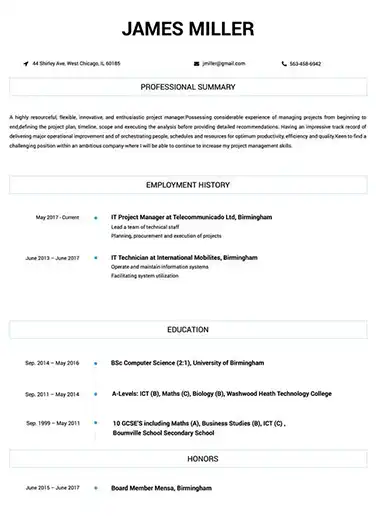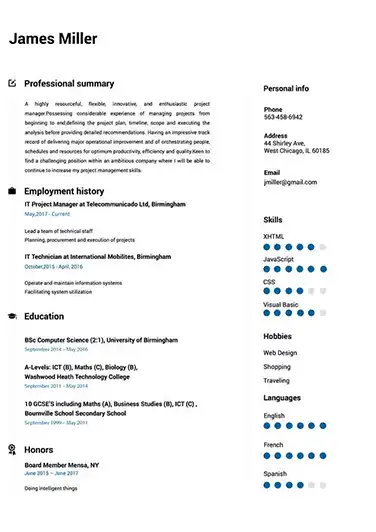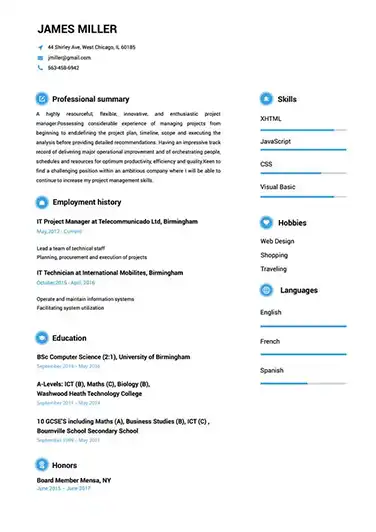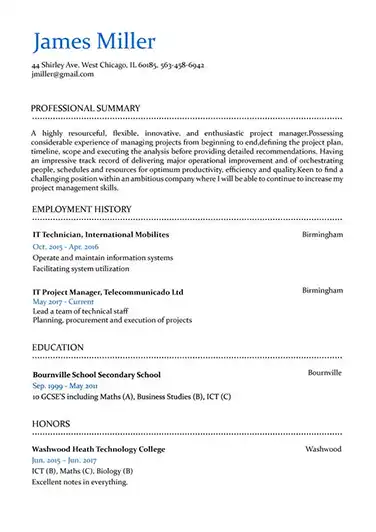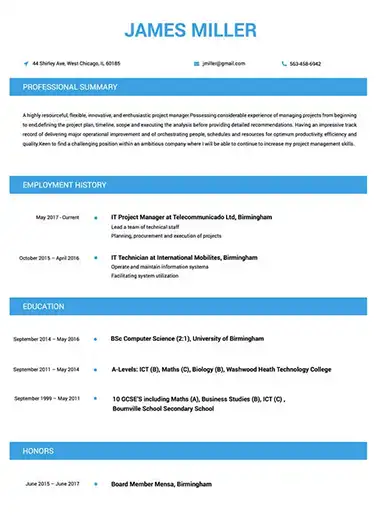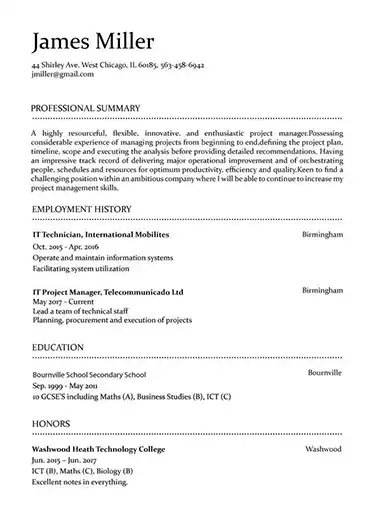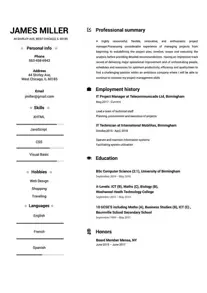 Use This Template
Use This Template
Build your resume in 15 minutes
Create an awesome resume that meets the expectations of potential employers with our selection of professional, field-tested resume templates.
event planner: Resume Samples & Writing Guide
roylong@icloud.com
897-618-4086
Employment history
- Create and manage event timelines
- Manage event logistics, including transportation, catering, and accommodations
- Provide on-site event support and troubleshooting
- Negotiate contracts and pricing with vendors
- Coordinate event staff and volunteers
- Manage event logistics, including transportation, catering, and accommodations
- Monitor event progress and make adjustments as needed
- Analyze event outcomes and provide reports to stakeholders
- Develop and implement event marketing and promotion plans
Education
Skills
Do you already have a resume? Use our PDF converter and edit your resume.
victorhall@protonmail.com
880-889-2946
Professional Summary
Employment history
- Coordinate with vendors to ensure all event needs are met
- Create detailed event plans and documents
- Develop and manage event budgets
- Manage event logistics, including transportation, catering, and accommodations
- Monitor event feedback and make recommendations for improvement
- Create detailed event plans and documents
- Negotiate contracts and pricing with vendors
- Analyze event outcomes and provide reports to stakeholders
- Provide on-site event support and troubleshooting
Education
Skills
taylorpaul@protonmail.com
792-416-2918
Employment history
- Manage event registration and ticket sales
- Monitor event feedback and make recommendations for improvement
- Analyze event outcomes and provide reports to stakeholders
- Manage event registration and ticket sales
- Negotiate contracts and pricing with vendors
- Coordinate with vendors to ensure all event needs are met
- Develop and implement event marketing and promotion plans
- Create and manage event timelines
- Manage event registration and ticket sales
Education
Skills
stanley_edwards@protonmail.com
709-210-4668
Employment history
- Coordinate with vendors to ensure all event needs are met
- Monitor event progress and make adjustments as needed
- Manage event logistics, including transportation, catering, and accommodations
- Develop invitations and other event materials
- Manage event registration and ticket sales
- Monitor event progress and make adjustments as needed
- Develop invitations and other event materials
- Analyze event outcomes and provide reports to stakeholders
- Manage event registration and ticket sales
Education
Skills
bernie-turner@mail.com
602-683-7986
Employment history
- Negotiate contracts and pricing with vendors
- Create detailed event plans and documents
- Analyze event outcomes and provide reports to stakeholders
- Monitor event feedback and make recommendations for improvement
- Develop and manage event budgets
- Negotiate contracts and pricing with vendors
- Create detailed event plans and documents
- Analyze event outcomes and provide reports to stakeholders
- Monitor event feedback and make recommendations for improvement
Education
Skills
Not in love with this template? Browse our full library of resume templates
Companies and individuals expect a lot out of an event planner. The buck stops at your feet, as you’ll be expected to take responsibility for nearly everything that happens. That’s why your resume needs to clearly communicate that you’re detail oriented, organized, confident, and capable.
Spelling mistakes, confusing structure, or even the wrong tone on an event planner resume can make a fatally bad first impression. On the other hand, getting all of those details just right means your event planner resume will be ready to get you hired at better gigs for higher pay. In other words, it’s absolutely worth taking the time to get your resume just right.
Luckily, this guide has all the information you need to do just that.
What you’ll learn from this guide:
- What a great event planner resume should look like
- How to ensure your resume makes it past ATS
- What you can do to appeal to recruiters
- The best formatting for an event planner resume
- How to list your education
- Which skills to include and how to give them more weight
- How to highlight your achievements
- Whether to include an objective or summary and how to write either
- What to do if you have little or no experience
- How to make your resume stand out
- The importance of using a resume builder
Event planner or coordinator resume template examples
Imagine asking someone to plan a major event like a conference who’s never attended one. You’re probably shuddering at the thought. After all, you need to be familiar with how events are experienced and what they’re like to be truly effective at planning them.
However, many people do the equivalent when creating a resume. Instead of looking at examples, they simply write what they think is best. Perhaps they’re basing this on what they remember resumes being like decades ago.
This is a recipe for mediocrity. Resumes have evolved and your event planner resume needs to show that you’ve evolved with them. From clean modern design to better writing and structure, look at these expertly curated event planner resume examples to get an initial idea for what yours should look like. Be sure to take notes about which elements you’d like to incorporate.
[Examples]
How to write an event planner resume that will get you noticed
Just like with an event, your resume can have something big and flashy but the real marker of quality is in all the small details. In fact, an event planner's resume shouldn't focus on being big or loud as this might worry a potential client or company that you won’t be flexible about their needs.
The better approach is to focus on crafting a resume that’s greater than the sum of its parts by nailing all the details. Don’t worry though, we’ll go over all of them. But the place to start, just like with event planning itself, is understanding the audience. You may assume that audience is a recruiter or client, but you’d only be half right.
Why you need to begin by thinking about ATS
ATS stands for Applicant Tracking System. It’s an AI-driven algorithm that scans large numbers of resumes to determine whether they should be immediately rejected or reviewed by a recruiter. While an individual client hiring an event planner isn’t going to use ATS, an enormous number of larger companies do. So unless you’ll only be using your resume for individuals and never companies, you need to be ATS-ready.
But what do you need to do to get past ATS? There are three simple steps:
- Ensure your resume is in the right file format. This is the easiest rule to follow. ATS are generally designed to work with .pdf, .doc, and .docx files. Any resume you submit should be in one of those formats.
- Ensure that file is ATS-compatible. Rule 1 aside, some files are easier to read for ATS than others. The way the data is structured within the file has a huge impact on whether an ATS can easily understand it or will simply reject your resume immediately. Don’t worry though, this doesn’t mean you need to go out and get a degree in computer science, you just need to use a resume builder which automatically generates ATS-friendly files (more on that later).
- Use keywords to your advantage. Here’s where the real art of writing for ATS comes into play. While each of the dozens of ATS software examples out there works slightly differently, they generally are given a set of keywords and requirements, then asked to filter out resumes that don’t have them. However, ATS aren’t perfect and they can easily misunderstand information in your resume. That’s why the key is to study the job description to determine which keywords and experiences they’re looking for before including them on your resume as closely to how they were originally written as possible. In essence, you’re making it as easy as possible for an ATS to see that you meet its requirements.
How to appeal to a recruiter or client
As an event planner or coordinator, you’ve already had plenty of practice in appealing to a client. This is a time to use those skills. If you’re applying for a position at a company, the recruiter or hiring manager who reads your resume is your client. Your resume needs to be tailored to appeal to them and not simply to show yourself off the way you want.
Begin by putting yourself in their shoes. What can you do to make their job easy, to make it as easy as possible for them to select you? By including keywords from the job description you’ve already taken the first step as the recruiter will be looking for these same requirements. But beyond that, you need to consider how the design of your resume can make it easier to read. After all, that recruiter might be looking at dozens or more resumes in a day, so if yours is easy on the eyes, they will appreciate that.
It’s also about how you structure the information, which brings us to formatting.
How should an event planner resume be formatted
The simple rule of resume formatting is that the most important information should go at the top. For example, if the job requires 5 years experience, don’t make the recruiter read through half the resume before they see that you meet that requirement. That critical information should be right at the top.
The same goes for your experience. Your work history should be in reverse chronological order, so your most recent jobs and projects go at the top. A recruiter should be able to get a feel for you as a candidate with just a quick glance, not be forced to dig through to find the information they need to evaluate you.
How long should your resume be?
Imagine planning a ceremony, should it be as long as possible so the participants can put in as many speeches as possible? The participants might enjoy that, but the audience will likely get bored and even annoyed. In this case, you are the participant and the recruiter is the audience. Writing a 3 page resume may make you feel good because you can go into plenty of detail about your event planning experience, but the recruiter will likely be exhausted and annoyed by it.
All that is to say, your resume should be as short as possible, while also including all the valuable information it can. An effective way to cut it down is to evaluate each sentence and section, asking yourself whether it adds value to the overall resume. If it isn’t making your resume better, it’s making your resume worse and should be cut.
What should event planners / coordinators put on a resume?
While the sections and information you choose should always be tailored to the specific event planning job you’re applying for, these are the main sections you should consider including:
- Resume objective or summary
- Work experience
- Licenses and Certifications
- Achievements
- Projects
- Education
- Hard skills
- Soft Skills
How to list your education in an event planner’s resume
The first question you should ask is whether your education is relevant. If you obtained a BA in biology 20 years ago, there’s no need to include that. However, if you’re a recent graduate or your degree is related to event management or planning, then you should include it.
But how much detail is necessary? In most cases, adding additional information about specific classes or activities isn’t needed. However if those elements are directly related to event planning then you can include them. Here are two examples to illustrate that:
BA in English
The University of North Carolina, Chapel Hill
1997-2001
-Took courses in medieval English literature
-Thesis focused on medieval English identity in The Canterbury Tales
-Captain of the university softball team
The problem here is that valuable space is wasted on details that have nothing to do with your ability to plan or coordinate events. That space should be spent on more valuable information.
Master of Management in Hospitality
Cornell University SC Johnson School of Business
2012-2016
-Planned 3 student Galas at the University Hotel
-Interned with the head event coordinator at the Overlook Hotel
This example has a degree directly related to event management and only mentions further details that are relevant. If this candidate was involved in other unrelated extracurricular activities, they don’t need to be mentioned.
How should your skills be included on an event planner resume?
Including the right skills is essential for getting past ATS and clearly demonstrating your strengths as an event planner. For example, the person hiring you needs to know whether you’re better at managing small details or managing teams you can delegate to. Above all, they need to see the skills they’ve told you are important in the job description reflected on your resume.
But just as important as which skills you have is the confidence the reader has in those skills. Anyone can simply state that they’re detail oriented, but a resume which gives a concrete example to demonstrate that skill will be far more impactful. Let’s look at two examples to see what that looks like in practice:
Budget management
Again, while stating that you have this skill is better than nothing, there’s no information to indicate how good you are at budget management.
Budget management
-Organized a 400 person wedding 7.5% under the initial budget.
With just a few words, this example gives a completely different impression than the previous one. A reader is more likely to think “wow, this person can clearly manage a budget well.”
Which hard skills are best to include
- Event coordination
- Budget management
- Event management software like Bitrix24 or Ticket Tailor
- Database software and management
- Catering management
- Project management
- Logistics and service ordering
Which soft skills are best to include
- Attention to detail
- Patience
- Problem solving
- Time management
- Leadership
- Communication
- Conflict resolution
How to use certifications to back up your critical skills
Besides including examples, certifications are one of the best ways to back up your skills. Beyond that, obtaining certifications also tells potential clients or employers that you care enough to go above and beyond the basics, a critical trait for any great event planner.
To include a certification, simply list it followed by the name of the certifying organization and the year you obtained it. If you’ve renewed it, mention when that was done as well.
Certified Special Events Professional (CSEP), International Live Events Association, 2017
Which certifications should you consider including?
Some of the top event planning certifications are:
- Certified Meetings Professional (CMP)
- Certified Special Events Professional (CSEP)
- Certified Professional in Catering and Events (CPCE)
- Certified Government Meeting Professional (CGMP)
- Global Travel Professional (GTP)
- Digital Event Strategist (DES)
- Certification in Meeting Management (CMM)
- Certified in Exhibition Management (CEM)
- Certified Trade Show Marketer (CTSM)
- Certified Event Planning Specialist (CEPS)
- Certified Quality Event Planner (CQEP)
How to highlight your most important achievements
Chances are you’ve planned some events outside of your career in event planning, so how do you include those kinds of experiences on your resume? That’s where a dedicated achievements section is ideal. Things you’ve achieved in your formal work should be left in your work history.
Like with your skills, the key to making your achievements more impactful is specificity.
Headed negotiations for the Medieval History Society of California’s annual meeting.
While this example isn’t terrible because the experience is relevant, a read would have many questions. When was this, how big was the meeting, what was the budget, how did the negotiations go, what kinds of things did you negotiate for, etc.? While you don’t need to answer all of these, being specific will dramatically change how your achievements are perceived.
Headed contractor negotiations for the 2016 Medieval History Society of California’s annual meeting to provide promotional materials, a venue, food, presentation equipment, etc. for 2,500 participants. Achieved an 18% reduction in costs relative to the previous year.
This version of the example leaves a far better impression, making this person sound extremely competent and detail-oriented.
What are the differences between resume objective and summary? Where do I use which?
Remember we talked about the importance of putting the most valuable information on your resume at the top? A resume objective or summary is the most effective way to do just that. They offer a flexible section where you can include information that doesn’t fit neatly anywhere else on your resume. For example, if you’re changing careers, you can include why you chose to do this.
Including an objective or summary first puts you more in control of the narrative of your resume by ensuring the reader sees specific contextual information first. But what’s the difference between the two?
A resume objective is only about a sentence and should focus on concisely explaining who you are and what you aim to achieve. A summary, on the other hand, can be a bit longer and is better if you have more information that you want to explain in this section and you don’t have a cover letter you can use for that purpose.
How to write a resume objective
A resume objective should be short and sweet. You need to get a lot of information into just a few words.
Emily is a talented event coordinator with the experience needed to ensure your events are a success.
This example gets some things right, but ultimately doesn’t do what a good resume objective should. It’s correctly written in the third person, but including your name isn’t necessary as it’s already at the top of your resume. This example fails the “add value” test. It doesn’t really tell the reader anything important.
CMP Certified event coordinator with 5 years experience in political fundraising looking to apply skills to coordinating annual meetings for ALPA.
This example immediately tells the reader that this person is certified, what kind of experience they have, and that they tailored their resume for this specific job. In other words, the most critical information from the whole resume is instantly communicated so the reader has a sense of the candidate.
How to write a resume summary
The important thing to note about a resume summary is that just because it can be longer doesn’t mean it should be. You have to value the time of the person reading your resume. They will greatly appreciate it if you do.
After many years working in hotel management I’ve decided that I would like to shift my career to focus more on event management because I’ve found I enjoy it much more. Although I’ve only assisted in some event planning and management in the past, I’m eager to learn and grow my skills.
There are a few critical mistakes in this resume summary. The first is that it’s written in the first person which, in addition to the overall tone, makes it sound rather unprofessional and unconfident. It also leaves out details like how long they’ve worked in hotel management and what kind of work they did assisting in event planning and management. Let’s see a better version for comparison:
Seasoned hotel management professional with 8 years experience looking to change careers to focus on event management. Hoping to leverage experience assisting in running conferences, weddings, and other events at the Marriott to assist KPMG in running more effective digital and in-person events.
This version contains useful details about the kind of experience the candidate has, why they’re switching careers, and how they will use their past experience in a new role. It also specifically mentions the employer, making it clear they took the time to customize this resume.
How to write an event planner / coordinator resume with little to no experience
Fortunately, you can gain a lot of relevant experience for being an excellent event planner or coordinator without ever having formally worked as one. You can focus on experiences when you’ve had to organize or manage events or projects in the past. Absent that kind of experience, try emphasizing relevant skills like attention to detail, being calm under pressure, and being extremely organized. Lastly, you can try and obtain a certification as this will make it much easier to get hired without much experience and is far faster as well as cheaper than a degree.
How to make your resume stand out
If you want your resume to stand out for the right reasons, get all those small details right. Have a trusted friend or colleague review your resume to help find areas to improve or mistakes you may have missed. By nailing every small detail in your resume instead of simply proclaiming yourself the best event manager around, you’ll be showing your abilities with actions instead of words.
That said, great design is another easy way to make your resume stand out from the standard boring resumes most recruiters see all day. Getting that design requires using a quality resume builder.
How Resumebuild.com’s resume builder tool makes it easy
A great event planner or coordinator has to know how to delegate. When you’re creating your resume, the best place to do that is with a resume builder. By using a tool like Resumebuild.com to ensure you have clean, modern design and an ATS-optimized file format, you can spend more time focusing on the content that will get you hired.
Browse through event planner resume templates for inspiration, create and save multiple versions of your resume for different jobs, and be confident that you’ve got a team of resume experts behind you to ensure you’re successful. After all, planning events takes enough time, so save it where you can and trust the experts.
event planner Job Descriptions; Explained
If you're applying for an event planner position, it's important to tailor your resume to the specific job requirements in order to differentiate yourself from other candidates. Including accurate and relevant information that directly aligns with the job description can greatly increase your chances of securing an interview with potential employers.
When crafting your resume, be sure to use action verbs and a clear, concise format to highlight your relevant skills and experience. Remember, the job description is your first opportunity to make an impression on recruiters, so pay close attention to the details and make sure you're presenting yourself in the best possible light.
event planner
- Anticipate customer needs, showing empathy and providing suggestions when appropriate to exceed their expectations.
- Provide premier customer service to become the sixth best-selling wedding cake team in the entire company.
- Answer inbound or make outbound calls and give information to callers, take messages, or transfer calls to appropriate individuals.
- Use computers for database or inventory management and word processing.
- Create, maintain, and enter information into databases within set time constraints.
- Complete forms and customer orders in accordance with company procedures, being sure to stay updated on what those procedures are.
- Schedule and confirm marketing appointments for new clients as appropriate.
event planner
- Maintain efficient and timely communication with team members throughout the day.
- Satisfy daily goals regarding sales, attendance, etc.
- Assist in general area cleaning and organization.
- Problem-solve to meet unique customer needs and work with management as appropriate to create unique processes to facilitate them.
event planner
- Offered options to client for event location.
- Corresponded with clients to answer questions and resolve issues.
- Arranged equipment, transportation, and other day-of-event needs.
- Coordinated with participating vendors during event planning.
- Performed face-to-face meetings to finalize contract for services and event details.
- Conferred with event staff at event site to coordinate details.
- Supervised helpers and co-workers.
event planner
- Designed and maintained spreadsheets documenting vendor, facility and guest information.
- Recommended money-saving strategies for events.
- Assessed events planning services and related costs.
- Hosted attendees during annual events.
event planner
- Event planning, design and production within time limits
- Working with clients to identify their needs and ensure customer satisfaction
- Organizing facilities and details such as decor, catering, entertainment, transportation, location, invitee list, special guests, equipment, promotional material etc.
- Hosted a statewide Youth Summit at Blackstone Academy on April 12th, 2018
event planner Job Skills
For an event planner position, your job skills are a key factor in demonstrating your value to the company and showing recruiters that you're the ight fit for the role. It's important to be specific when highlighting your skills and ensure that they are directly aligned with the job requirements, as this can greatly improve your chances of being hired. By showcasing your relevant skills and experience, you can make a compelling case for why you're the best candidate for the job.
How to include technical skills in your resume:
Technical skills are a set of specialized abilities and knowledge required to perform a particular job
effectively. Some examples of technical skills are data analysis, project management, software proficiency,
and programming languages, to name a few.
Add the technical skills that will get hired in your career
field with our simple-to-use resume builder. Select your desired resume template, once you reach the skills
section of the builder, manually write in the skill or simply click on "Add more skills". This will
automatically generate the best skills for your career field, choose your skill level, and hit "Save &
Next."
- Data Analysis
- Troubleshooting
- Quality Assurance
- Database Management
- Project Management
- Technical
- Computer Literacy
- Reporting
- Business Acumen
- Process Improvement
- Financial Management
- Visualization
- Strategic Thinking
- Relationship Management
- Innovation
- Training
- Supervisory
- Risk Management
- Accounting
- Presentation
- Written Communication
How to include soft skills in your resume:
Soft skills are non-technical skills that relate to how you work and that can be used in any job. Including
soft skills such as time management, creative thinking, teamwork, and conflict resolution demonstrate your
problem-solving abilities and show that you navigate challenges and changes in the workplace
efficiently.
Add competitive soft skills to make your resume stand-out to recruiters! Simply select
your preferred resume template in the skills section, enter the skills manually or use the "Add more skills"
option. Our resume builder will generate the most relevant soft skills for your career path. Choose your
proficiency level for each skill, and then click "Save & Next" to proceed to the next section.
- Communication
- Interpersonal
- Leadership
- Time Management
- Problem Solving
- Decision Making
- Critical Thinking
- Creativity
- Adaptability
- Teamwork
- Organization
- Planning
- Public Speaking
- Negotiation
- Conflict Resolution
- Research
- Analytical
- Attention to Detail
- Self-Motivation
- Stress Management
- Collaboration
- Coaching
- Mentoring
- Listening
- Networking
- Strategic Thinking
- Negotiation
- Emotional Intelligence
- Adaptability
- Flexibility
- Reliability
- Professionalism
- Computer Literacy
- Technical
- Data Analysis
- Project Management
- Customer Service
- Presentation
- Written Communication
- Social Media
- Troubleshooting
- Quality Assurance
- Collaboration
- Supervisory
- Risk Management
- Database Management
- Training
- Innovation
- Documentation
- Accounting
- Financial Management
- Visualization
- Reporting
- Business Acumen
- Process Improvement
- Documentation
- Relationship Management.
How to Improve Your event planner Resume
Navigating resume pitfalls can mean the difference between landing an interview or not. Missing job descriptions or unexplained work history gaps can cause recruiters to hesitate. Let's not even talk about the impact of bad grammar, and forgetting your contact info could leave your potential employer hanging. Aim to be comprehensive, concise, and accurate.
Professional Summary
Employment history
- Moneitor event progresss and make adjustmens as needed
- Manage event registation and ticket saleses
- Develop inviations and other event materialls
- Creat and manag event timelines
- Monitor event progres and make adjustments as need
- Coordinat with venders to ensure all event need are met
- Coorinate with vendors too ensure all event needs are metted
- Developed and implemented event marketing and promotions plans
- Developed invitations and other events materials
Education
Skills
Avoid Spelling Mistakes and Include your Contact Information
Missing contact information prevents recruiters from understanding you're the best fit for the position.
Key Insights- Make sure you're not missing contact information on your resume. That should include your full name, telephone number and email address.
- Make sure to use a professional email address as part of your contact information.
- Highlight your contact information and double check that everything is accurate to help recruiters get in touch with you.
How to Optimize Your event planner Resume
Keep an eye out for these resume traps. Neglecting to detail your job roles or explain gaps in your career can lead to unnecessary doubts. Grammar blunders can reflect negatively on you, and without contact information, how can employers reach you? Be meticulous and complete.
kennymiller@mail.com
948-904-0118
Employment history
- Develop and implement event marketing and promotion plans
- Coordinate event staff and volunteers
- Manage event registration and ticket sales
- Coordinate event staff and volunteers
- Develop and manage event budgets
- Negotiate contracts and pricing with vendors
Education
Skills
Unexplained Year Gaps and Missing Job Experiences are a No-no
Gaps in your resume can prevent recruiters from hiring you if you don't explain them.
Key Insights- It's okay to have gaps in your work experience but always offer a valid explanation instead of just hiding it.
- Use the gap to talk about positive attributes or additional skills you've learned.
- Be honest and straightforward about the gap and explain it using a professional summary.
event planner Cover Letter Example
A cover letter can be a valuable addition to your job application when applying for an event planner position. Cover letters provide a concise summary of your qualifications, skills, and experience, also it also gives you an opportunity to explain why you're the best fit for the job. Crafting a cover letter that showcases your relevant experience and enthusiasm for the Accounts Payable role can significantly improve your chances of securing an interview.
Long roylong@icloud.com
897-618-4086
452 Cedarwood Court, Brady, MT
59416
Amazon
Seattle, Washington
Greetings Amazon Hiring Team
I am a results-driven Event Planner with 9 years of experience in the field. I am excited to submit my application for the Chief Event Planner role at Amazon, where I believe I can make a valuable contribution to your team.
As someone who has always been committed to making a positive impact on the world, I have pursued opportunities to contribute to my community through my work wherever I may be. My experience in this field has equipped me with the skills and knowledge necessary to succeed throughout my life and I am confident that they will help me to bring my passion and expertise to your organization and help drive your success.
I cannot stress enough how thrilled I am about the chance to join a team of like-minded individuals who share my values and passion for this amazing field. Thank you for considering my application and I hope for the chance to work together.
Best regards,
Roy Long
897-618-4086
roylong@icloud.com
Roy Long
Showcase your most significant accomplishments and qualifications with this cover
letter.
Personalize this cover letter in just few minutes with our user-friendly tool!
Related Resumes & Cover Letters
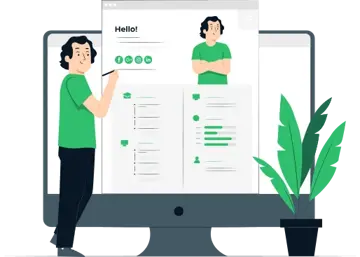
Build your Resume in 15 minutes
Create an awesome resume that meets the expectations of potential employers with our selection of professional, field-tested resume templates.

